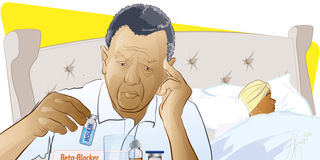Health Matters: How menopause affects your libido

Menopause can affect your libido. PHOTO| FOTOSEARCH
What you need to know:
- Many couples go through decreased intimacy in their late forties to sixties
- This is a phase of life when sexuality transitions
- Menopausal women suffer low levels of androgens, the hormones needed for sexual vitality
- Men also experience decreased libido due to age and onset of lifestyle illnesses
When James developed erection problems he did not come to the Sexology Clinic immediately. He comfortably lived with it for two years before seeking care.
"I have not come for treatment," he explained on his first visit to the clinic, "I have come because I am almost going crazy, I do not understand why my wife is so comfortable with us not having sex; she encourages me not to get treated, that she is fine with me the way I am." He suspected that his wife was having an affair but did not have proof. He also lacked the courage to ask her. He blamed himself for the failing erections and rationalised that his wife got sexual satisfaction from elsewhere.
James was an electrical engineer working for a phone company. He was 60, diabetic and hypertensive, and had also been diagnosed with high cholesterol. He was on a cocktail of medicines for the diseases. Hormone tests showed that his testosterone was also borderline low. I attributed his erection failure to the illnesses he was having, the medicines he was using, and the low testosterone levels.
James was married to Nancy, an agriculturalist. Nancy was 54 and two years prior had gone through menopause.
This couple reminded me of the missed opportunity many couples go through in their late forties to sixties. This is a phase of life when sexuality transitions. For women, the estrogen hormones go down drastically, menstruation stops, and sex organs atrophy. Skin changes also happen with wrinkles getting pronounced. Muscles get loose; breasts lose turgidity and become flatter. Most women begin to hate their appearances.
Mood swings problems also set in. The woman gets rather irritable. They tend to lack sleep. They get episodes of unbearable hotness of the body called hot flashes. The perception they have always had of their husbands change and they do not see them as physically and emotionally appealing.
Other than the estrogen hormones, women in menopause suffer low levels of androgens, the hormones needed for sexual vitality. As such they have no desire for sex, sexual arousal becomes difficult and sex can be painful. Orgasm becomes less common.
"I have been experiencing these problems and so when my husband developed erection problems I was relieved," Nancy said when she accompanied James to the clinic for subsequent visits.
The couple's experiences are similar to many others that are staring at menopause for the woman as well as failing general health in the man. Unfortunately, many such couples suffer in silence. Possibly they do not know what to do. They are not aware that sex counseling, just like it is important before marriage, is also important as they get into their fifties. Both the man and woman, are likely to face a variety of sexual challenges given the changes in their bodies around this time. Self-confidence is likely to go down and one's ego can crash as one realises that their vitality is diminishing. Many couples find it hard to communicate their feelings to each other. Relationship conflicts are common as a result.
"So what is the way forward out of this complex situation?" James asked, "Is there any hope left for us to get back to a level of normality?"
Well, knowledge is power. Being aware of what to expect is in itself part of the healing process. On a more positive note, age-related sexual difficulties can be treated. Diabetes, hypertension, high cholesterol, hormone problems, and many more causes of erection failure can be treated. Problems associated with menopause are also treatable.
Dealing with the falling intimacy calls for intimacy and relationship counseling too. Further, sex therapy and coaching are equally important. James and Nancy, therefore, went through all these modalities of treatment. It was not until three months later that they had satisfactory intimacy.
"I wish we knew what to do earlier, it would have saved us a lot of the agony we have had to endure," James said on their last visit to the clinic.





